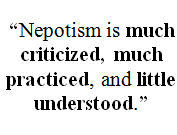What makes a good, strong relationship? I’ve been having a
lot of these conversations lately with friends and colleagues. There was one
common theme; in any solid relationship, someone has to take a step back and both
partners cannot be uber ambitious go-getters.
Some believe that once you have kids, mum needs to stay home
and make her life ‘all about the children’. Others thought it was good for mum
and dad to work to make the kids more independent. Ofcourse this only needs to
be thought about once you have kids. What about before you had them? Were both
partners highly career oriented? Or, was one of you already starting to gear up
for the ‘pause’. And who made the decision on which one of you was going to
take a step back? Was it your partner? Was it you? Was it the extended family?
Or was it your employer?
 |
| Photo Credit: @managementlink.wordpress.com |
Let’s say they hire both
parties and some months down the line, they say, “Oops! Sorry. We’ll keep one
and have to move the other to a different department. Not because of your
performance, but because of ‘Nepotism’ ”. Even though the couple works as team
in most aspects of life, in the workplace, they are competitors. That’s the
harsh reality.
Ofcourse, you are happy for your partner. But how do you then feel? How do you not feel like one of you has won and the other… has lost? And carry that feeling back home?
This got me thinking, “Where did the term nepotism
originate? A quick search in the Merriam Webster dictionary led me to the
explanation, “the unfair practice by a powerful person of giving jobs and other
favors to relatives”. This is ofcourse something to be avoided. But to what
degree? It makes sense in politics and business. But what about low level jobs?
How do you then quantify the risk of nepotism?
According to a study by the anti-poverty charity Oxfam, the
wealthiest 1% will soon own more than the rest of the world's population. Is
nepotism something that really only applies to the wealthy and the top
performers or is it something that every individual has to think about; no
matter their position in the workforce? Where do you draw the line? Does this
extend to good friends? What about the partner you’ve been with for a few years
but haven’t yet taken the step of getting that piece of paper signed? Does one
single 8½ in × 11 in piece of paper really have so much power that it makes the
world sit up and take notice? And are you really trying to tell me that the
wealthiest 1% are not good friends? Almost ‘like family’?
In this day and age where couples meet in university, either employers are going to have to start getting more intelligent about how they define nepotism and less selfish about how they practice the policy or risk looking very foolish later on down the line.
What about rejecting somebody because they remind you of that nasty bully in high school? Isn’t there a rule against holding a grudge somewhere too?
Thoughts?
